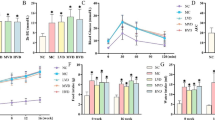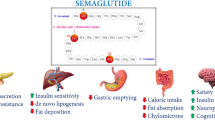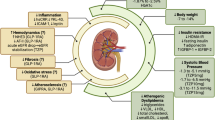Abstract
Insulin signaling and lipid metabolism are disrupted by long-term consumption of a high-fat diet (HFD). This disruption can lead to insulin resistance, dyslipidemia and subsequently renal dysfunction as a consequence of the inactivation of the AMP-activated protein kinase (AMPK) and peroxisome proliferator-activated receptor-α (PPARα) or AMPK/PPARα pathways. We investigated the impact of metformin on the prevention of renal dysfunction through the modulation of AMPK-regulated PPARα-dependent pathways in insulin-resistant rats induced by a HFD. Male Wistar rats were fed a HFD for 16 weeks to induce insulin resistance. After insulin resistance had been confirmed, metformin (30 mg/kg) or gemfibrozil (50 mg/kg) was given orally for 8 weeks. Evidence of insulin resistance, dyslipidemia, lipid accumulation and kidney injury were observed in HF rats. Impairment of lipid oxidation, energy metabolism and renal organic anion transporter 3 (Oat3) expression and function were demonstrated in HF rats. Metformin can stimulate the AMPK/PPARα pathways and suppress sterol regulatory element-binding transcription factor 1 (SREBP1) and fatty acid synthase (FAS) signaling (SREBP1/FAS) to enable the regulation of lipid metabolism. Renal inflammatory markers and renal fibrosis expression induced by a HFD were more effectively reduced after metformin treatment than after gemfibrozil treatment. Interestingly, renal Oat3 function and expression and kidney injury were improved following metformin and gemfibrozil treatment. Renal cluster of differentiation 36 (CD36) or sodium glucose cotransporter type 2 (SGLT2) expression did not differ after treatment with metformin or gemfibrozil. Metformin and gemfibrozil could reduce the impairment of renal injury in obese conditions induced by a HFD through the AMPK/PPARα-dependent pathway. Interestingly, metformin demonstrated greater efficacy than gemfibrozil in attenuating renal lipotoxicity through the AMPK-regulated SREBP1/FAS signaling pathway.





Similar content being viewed by others
References
Abdelkader NF, Elbaset MA, Moustafa PE, Ibrahim SM (2022) Empagliflozin mitigates type 2 diabetes-associated peripheral neuropathy: a glucose-independent effect through AMPK signaling. Arch Pharm Res 45:475–493. https://doi.org/10.1007/s12272-022-01391-5
Arruda AC, Perilhao MS, Santos WA, Gregnani MF, Budu A, Neto JCR, Estrela GR, Araujo RC (2020) PPARalpha-dependent modulation by metformin of the expression of OCT-2 and MATE-1 in the kidney of mice. Molecules. https://doi.org/10.3390/molecules25020392
Bai F, Liu Y, Tu T, Li B, Xiao Y, Ma Y, Qin F, Xie J, Zhou S, Liu Q (2019) Metformin regulates lipid metabolism in a canine model of atrial fibrillation through AMPK/PPAR-alpha/VLCAD pathway. Lipids Health Dis 18:109. https://doi.org/10.1186/s12944-019-1059-7
Burri L, Thoresen GH, Berge RK (2010) The role of PPARalpha activation in liver and muscle. PPAR Res 2010. https://doi.org/10.1155/2010/542359
Ceja-Galicia ZA, Garcia-Arroyo FE, Aparicio-Trejo OE, El-Hafidi M, Gonzaga-Sanchez G, Leon-Contreras JC, Hernandez-Pando R, Guevara-Cruz M, Tovar AR, Rojas-Morales P, Aranda-Rivera AK, Sanchez-Lozada LG, Tapia E, Pedraza-Chaverri J (2022) Therapeutic effect of curcumin on 5/6Nx Hypertriglyceridemia: association with the improvement of renal mitochondrial beta-oxidation and lipid metabolism in kidney and liver. Antioxidants 11(11):2195. https://doi.org/10.3390/antiox11112195
Chen WL, Chen YL, Chiang YM, Wang SG, Lee HM (2012) Fenofibrate lowers lipid accumulation in myotubes by modulating the PPARalpha/AMPK/FoxO1/ATGL pathway. Biochem Pharmacol 84:522–531. https://doi.org/10.1016/j.bcp.2012.05.022
Chung S, Park CW (2011) Role of peroxisome proliferator-activated receptor alpha in Diabetic Nephropathy. Diabetes Metab J 35:327–336. https://doi.org/10.4093/dmj.2011.35.4.327
Correia S, Carvalho C, Santos MS, Seica R, Oliveira CR, Moreira PI (2008) Mechanisms of action of metformin in type 2 diabetes and associated complications: an overview. Mini Rev Med Chem 8:1343–1354. https://doi.org/10.2174/138955708786369546
Das S, Choudhuri D (2022) Dietary calcium regulates the risk renal injury in high fat diet induced obese rats by regulating renal lipid metabolism, oxidative stress and inflammation. Arch Physiol Biochem 128:1039–1049. https://doi.org/10.1080/13813455.2020.1746812
Deguchi T, Kusuhara H, Takadate A, Endou H, Otagiri M, Sugiyama Y (2004) Characterization of uremic toxin transport by organic anion transporters in the kidney. Kidney Int 65:162–174. https://doi.org/10.1111/j.1523-1755.2004.00354.x
Dorotea D, Koya D, Ha H (2020) Recent insights into SREBP as a direct mediator of kidney fibrosis via lipid-independent pathways. Front Pharmacol 11:265. https://doi.org/10.3389/fphar.2020.00265
Duan SZ, Usher MG, Mortensen RM (2009) PPARs: the vasculature, inflammation and hypertension. Curr Opin Nephrol Hypertens 18:128–133. https://doi.org/10.1097/MNH.0b013e328325803b
Feng M, Liu F, Xing J, Zhong Y, Zhou X (2021) Anemarrhena saponins attenuate insulin resistance in rats with high-fat diet-induced obesity via the IRS-1/PI3K/AKT pathway. J Ethnopharmacol 277:114251. https://doi.org/10.1016/j.jep.2021.114251
Ge M, Fontanesi F, Merscher S, Fornoni A (2020) The vicious cycle of renal lipotoxicity and mitochondrial dysfunction. Front Physiol 11:732. https://doi.org/10.3389/fphys.2020.00732
Hu D, Guo Y, Wu R, Shao T, Long J, Yu B, Wang H, Luo Y, Lu H, Zhang J, Chen YE, Peng D (2021) New Insight into Metformin-Induced cholesterol-lowering Effect Crosstalk between glucose and cholesterol homeostasis via ChREBP (carbohydrate-Responsive element-binding Protein)-Mediated PCSK9 (Proprotein Convertase Subtilisin/Kexin type 9) regulation. Arterioscler Thromb Vasc Biol 41:e208–e223. https://doi.org/10.1161/ATVBAHA.120.315708
Jaikumkao K, Pongchaidecha A, Chueakula N, Thongnak LO, Wanchai K, Chatsudthipong V, Chattipakorn N, Lungkaphin A (2018) Dapagliflozin, a sodium-glucose co-transporter-2 inhibitor, slows the progression of renal complications through the suppression of renal inflammation, endoplasmic reticulum stress and apoptosis in prediabetic rats. Diabetes Obes Metab 20:2617–2626. https://doi.org/10.1111/dom.13441
Khnychenko LK, Okunevich IV, Losev NA, Sapronov NS (2016) [Hypolipidemic activity of N-cholinergic antagonist Benzohexonium in the experiments ]. Patol Fiziol Eksp Ter 60:36–43
Kim SJ, Kim JE, Kim YW, Kim JY, Park SY (2017) Nutritional regulation of renal lipogenic factor expression in mice: comparison to regulation in the liver and skeletal muscle. Am J Physiol Renal Physiol 313:F887–F898. https://doi.org/10.1152/ajprenal.00594.2016
Koziolek M, Mueller GA, Dihazi GH, Jung K, Altubar C, Wallbach M, Markovic I, Raddatz D, Jahn O, Karakose H, Lenz C, Urlaub H, Dihazi A, El Meziane A, Dihazi H (2020) Urine E-cadherin: a marker for early detection of kidney injury in diabetic patients. J Clin Med. https://doi.org/10.3390/jcm9030639
Liu Q, Zhang F, Zhang X, Cheng R, Ma JX, Yi J, Li J (2018) Fenofibrate ameliorates diabetic retinopathy by modulating Nrf2 signaling and NLRP3 inflammasome activation. Mol Cell Biochem 445:105–115. https://doi.org/10.1007/s11010-017-3256-x
Lu J, Shi J, Li M, Gui B, Fu R, Yao G, Duan Z, Lv Z, Yang Y, Chen Z, Jia L, Tian L (2015) Activation of AMPK by metformin inhibits TGF-beta-induced collagen production in mouse renal fibroblasts. Life Sci 127:59–65. https://doi.org/10.1016/j.lfs.2015.01.042
Mittal PG, Samujh R, Peters NJ, Sharma S (2022) Correlation of urinary biomarkers (Interleukin-6, transforming growth factor-beta, E-Cadherin, and MCP-1) with conventional parameters of Disease Progression in patients of posterior urethral valves: a comparative analysis. J Indian Assoc Pediatr Surg 27:537–543. https://doi.org/10.4103/jiaps.jiaps_182_21
Movsesyan VA, Yakovlev AG, Dabaghyan EA, Stoica BA, Faden AI (2002) Ceramide induces neuronal apoptosis through the caspase-9/caspase-3 pathway. Biochem Biophys Res Commun 299:201–207. https://doi.org/10.1016/s0006-291x(02)02593-7
Nikravesh H, Khodayar MJ, Mahdavinia M, Mansouri E, Zeidooni L, Dehbashi F (2018) Protective effect of Gemfibrozil on Hepatotoxicity Induced by Acetaminophen in mice: the importance of oxidative stress suppression. Adv Pharm Bull 8:331–339. https://doi.org/10.15171/apb.2018.038
Nishizawa K, Yoda N, Morokado F, Komori H, Nakanishi T, Tamai I (2019) Changes of drug pharmacokinetics mediated by downregulation of kidney organic cation transporters Mate1 and Oct2 in a rat model of hyperuricemia. PLoS ONE 14:e0214862. https://doi.org/10.1371/journal.pone.0214862
Patten IS, Arany Z (2012) PGC-1 coactivators in the cardiovascular system. Trends Endocrinol Metab 23:90–97. https://doi.org/10.1016/j.tem.2011.09.007
Pawlak M, Lefebvre P, Staels B (2015) Molecular mechanism of PPARalpha action and its impact on lipid metabolism, inflammation and fibrosis in non-alcoholic fatty liver disease. J Hepatol 62:720–733. https://doi.org/10.1016/j.jhep.2014.10.039
Pengrattanachot N, Cherngwelling R, Jaikumkao K, Pongchaidecha A, Thongnak L, Swe MT, Chatsudthipong V, Lungkaphin A (2020) Atorvastatin attenuates obese-induced kidney injury and impaired renal organic anion transporter 3 function through inhibition of oxidative stress and inflammation. Biochim Biophys Acta Mol Basis Dis 1866:165741. https://doi.org/10.1016/j.bbadis.2020.165741
Pineda Torra I, Gervois P, Staels B (1999) Peroxisome proliferator-activated receptor alpha in metabolic disease, inflammation, atherosclerosis and aging. Curr Opin Lipidol 10:151–159. https://doi.org/10.1097/00041433-199904000-00009
Sokolowska E, Blachnio-Zabielska A (2019) The role of ceramides in insulin resistance. Front Endocrinol (Lausanne) 10:577. https://doi.org/10.3389/fendo.2019.00577
Song A, Zhang C, Meng X (2021) Mechanism and application of metformin in kidney diseases: an update. Biomed Pharmacother 138:111454. https://doi.org/10.1016/j.biopha.2021.111454
Thongnak L, Pongchaidecha A, Jaikumkao K, Chatsudthipong V, Chattipakorn N, Lungkaphin A (2017) The additive effects of atorvastatin and insulin on renal function and renal organic anion transporter 3 function in diabetic rats. Sci Rep 7:13532. https://doi.org/10.1038/s41598-017-13206-5
Thongnak L, Chatsudthipong V, Lungkaphin A (2020a) Mitigation of renal inflammation and endoplasmic reticulum stress by vildagliptin and statins in high-fat high-fructose diet-induced insulin resistance and renal injury in rats. Biochim Biophys Acta Mol Cell Biol Lipids 1865:158755. https://doi.org/10.1016/j.bbalip.2020.158755
Thongnak L, Pongchaidecha A, Lungkaphin A (2020b) Renal lipid metabolism and lipotoxicity in diabetes. Am J Med Sci 359:84–99. https://doi.org/10.1016/j.amjms.2019.11.004
Van Stee MF, De Graaf AA, Groen AK (2018) Actions of metformin and statins on lipid and glucose metabolism and possible benefit of combination therapy. Cardiovasc Diabetol 17:94. https://doi.org/10.1186/s12933-018-0738-4
Wanchai K, Yasom S, Tunapong W, Chunchai T, Eaimworawuthikul S, Thiennimitr P, Chaiyasut C, Pongchaidecha A, Chatsudthipong V, Chattipakorn S, Chattipakorn N, Lungkaphin A (2018a) Probiotic Lactobacillus paracasei HII01 protects rats against obese-insulin resistance-induced kidney injury and impaired renal organic anion transporter 3 function. Clin Sci (Lond) 132:1545–1563. https://doi.org/10.1042/CS20180148
Wanchai K, Yasom S, Tunapong W, Chunchai T, Thiennimitr P, Chaiyasut C, Pongchaidecha A, Chatsudthipong V, Chattipakorn S, Chattipakorn N, Lungkaphin A (2018b) Prebiotic prevents impaired kidney and renal Oat3 functions in obese rats. J Endocrinol 237:29–42. https://doi.org/10.1530/JOE-17-0471
Wang C, Li L, Liu S, Liao G, Li L, Chen Y, Cheng J, Lu Y, Liu J (2018) GLP-1 receptor agonist ameliorates obesity-induced chronic kidney injury via restoring renal metabolism homeostasis. PLoS ONE 13:e0193473. https://doi.org/10.1371/journal.pone.0193473
Wu W, Bush KT, Nigam SK (2017) Key role for the Organic Anion Transporters, OAT1 and OAT3, in the in vivo handling of Uremic Toxins and Solutes. Sci Rep 7:4939. https://doi.org/10.1038/s41598-017-04949-2
Yokoi H, Yanagita M (2016) Targeting the fatty acid transport protein CD36, a class B scavenger receptor, in the treatment of renal disease. Kidney Int 89:740–742. https://doi.org/10.1016/j.kint.2016.01.009
Zhang X, Wang S, Hu L, Wang J, Liu Y, Shi P (2019) Gemfibrozil reduces lipid accumulation in SMMC-7721 cells via the involvement of PPARalpha and SREBP1. Exp Ther Med 17:1282–1289. https://doi.org/10.3892/etm.2018.7046
Acknowledgements
This project is funded by National Research Council of Thailand (NRCT) and Chiang Mai University: N42A650306 (NRCT: N42A650306, AL); Functional Foods for Health and Disease, Faculty of Medicine, Chiang Mai University (AL), Faculty of Medicine, Chiang Mai University (AL); Functional Foods Research Center for Well-Being, Chiang Mai University (AL) and partially supported by Chiang Mai University (AL, LT).
Author information
Authors and Affiliations
Corresponding author
Ethics declarations
Conflict of interest
The authors declare no competing interests.
Additional information
Publisher’s Note
Springer Nature remains neutral with regard to jurisdictional claims in published maps and institutional affiliations.
Supplementary Information
Below is the link to the electronic supplementary material.
Rights and permissions
Springer Nature or its licensor (e.g. a society or other partner) holds exclusive rights to this article under a publishing agreement with the author(s) or other rightsholder(s); author self-archiving of the accepted manuscript version of this article is solely governed by the terms of such publishing agreement and applicable law.
About this article
Cite this article
Thongnak, L., Pengrattanachot, N., Promsan, S. et al. Metformin mitigates renal dysfunction in obese insulin-resistant rats via activation of the AMPK/PPARα pathway. Arch. Pharm. Res. 46, 408–422 (2023). https://doi.org/10.1007/s12272-023-01439-0
Received:
Accepted:
Published:
Issue Date:
DOI: https://doi.org/10.1007/s12272-023-01439-0




